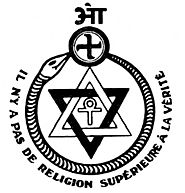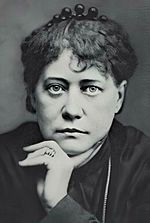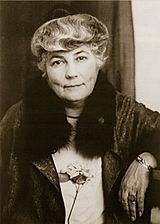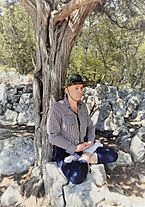Victor Skumin facts for kids
Quick facts for kids
Victor Skumin
Виктор Андреевич Скумин |
|
|---|---|
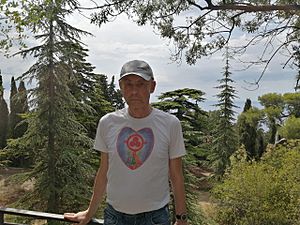
Victor Skumin in 2020
|
|
| Born | 30 August 1948 Pensa Oblast, RSFSR, Soviet Union
|
| Nationality | Soviet, Russian |
| Alma mater | Kharkiv National Medical University |
| Scientific career | |
| Fields | Psychiatry, psychotherapy, psychology, philosophy |
| Institutions | Kiev Institute of Cardiovascular Surgery (ru), Kharkiv Medical Academy of Post-graduate Education, Kharkiv State Academy of Culture, The World Organisation of Culture of Health (Moscow) |
| Doctoral advisor | Nikolai Amosov |
Victor Andreevich Skumin (Russian: Ви́ктор Андре́евич Ску́мин, born on August 30, 1948) is a Russian and Soviet scientist. He is known as a psychiatrist (a doctor who treats mental health issues), a philosopher, and a writer.
After finishing his studies at the Kharkiv National Medical University in 1973, he became a psychotherapist. A psychotherapist helps people with their mental and emotional problems. He worked at the Kiev Institute of Cardiovascular Surgery. In 1978, he identified a new condition called Skumin syndrome. He also created a way to help heart surgery patients recover mentally. This method used positive self-talk to help them feel better (1979).
From 1980 to 1990, he was a professor of psychotherapy. He discovered a specific set of mental symptoms related to long-term physical illnesses. He also developed a new idea about how mental health affects chronic physical diseases.
Later, from 1990 to 1994, Skumin taught psychology and pedagogy (the study of teaching) at the Kharkiv State Academy of Culture. In 1994, he helped start and became the first president of the World Organisation of Culture of Health in Moscow. In 1995, he became the first editor of the journal To Health via Culture. He is also famous for creating the term "Culture of Health" in 1968.
Besides his work in psychiatry and psychology, Skumin writes about healthy living, yoga, and philosophy. He has written many books and articles about Agni Yoga, Roerichism, Russian cosmism, and New Age ideas. He has also written fiction books and songs.
Contents
Early Life and Education
Victor Skumin was born on August 30, 1948, in Penza Oblast, which was part of the Soviet Union. His father was an officer in the Soviet military. Because his father moved for work, Victor studied in different cities like Kazan, Penza, Chelyabinsk, and Petrozavodsk.
Skumin studied medicine at the Kharkiv National Medical University. This university has a long history, going back over 200 years. It started as the Medical Faculty of the University of Kharkiv, which was founded in 1804. Many famous scientists, including Nobel Prize winners, studied or worked there.
Skumin graduated with honors in 1973. In 1968, while still a student, he came up with the idea of "Culture of Health." This term became very popular. The main goal of a Culture of Health is to create programs that help people feel good in their bodies, minds, and spirits.
Victor Skumin is married and has two sons, Andrew and Maxim. He also has a granddaughter, Alice, and a grandson, Alexey.
Contributions to Health and Psychology
Helping Heart Surgery Patients
From 1976 to 1980, Skumin studied the mental and emotional challenges faced by patients undergoing heart surgery. He worked with Nikolai Amosov, a famous surgeon who founded the Kiev Institute of Cardiovascular Surgery. This institute was the first in Ukraine to perform heart operations, including those using heart-lung machines and replacing heart valves.
Heart valve replacement is a major surgery. It involves replacing a faulty heart valve with an artificial one. These artificial valves are made of metal and carbon and can last a lifetime. However, they make unique sounds and vibrations inside the body. Patients with these valves must take blood-thinning medicine to prevent clots.
In 1978, Skumin described a condition he called Skumin syndrome. This syndrome is a mental health issue linked to having an artificial heart valve. It causes feelings of fear, anxiety, sadness, and trouble sleeping. It can also make people feel very tired. In 2011, a French scientist named Alain Carpentier said that about a quarter of patients with artificial heart valves develop Skumin syndrome. This problem might also happen with artificial hearts.
A Russian news agency, RIA Novosti, wrote about this in 2014:
Victor Skumin, our scientist, described "cardioprosthetic psychopathologic syndrome," known as "Skumin syndrome." The person's mind is always focused on the sound of the artificial heart valve. Unlike a fake tooth or limb, you can't ignore the sound of an implant inside your body. People constantly worry if the device will stop. A natural heart gives pain signals, but an artificial one does not. In the future, there might be artificial hearts that mimic a heartbeat. But they won't feel pain, and Skumin syndrome might still affect people with heart valve replacements.
Skumin also developed ways to treat and help patients recover from this syndrome. He created a special medicine called Skumin's mixture. This medicine helps calm the nervous system. It is used for Skumin syndrome, mild heart problems, anxiety, and sleep issues. It is usually well-tolerated and contains natural ingredients like Adonis vernalis, Crataegus, Valerian root, and Peppermint.
For mental recovery, Skumin also created a special mind control method in 1979. This method is based on autogenic training, a relaxation technique. It involves daily short sessions where a person repeats certain thoughts or visualizations to relax.
The Skumin mind control method uses two main positions: sitting or lying down. It includes five exercises: "relaxation," "warming," "zero gravity," "target autosuggestion" (positive self-talk), and "psychological activation." This method helps reduce stressful emotions and reorganize a person's thoughts. It has been used to treat phobias and headaches.
Many experts, including Nikolai Amosov, have confirmed Skumin's work on this syndrome and its treatment. For this research, he earned his first advanced scientific degree in 1980.
Helping Children with Digestive Issues
From 1980 to 1990, Skumin was a professor of psychotherapy. During this time, he studied mental health problems in children and teenagers with long-term digestive system diseases.
Being sick, especially from a young age, can be very hard for children. It can affect their feelings and how they cope. Skumin found that many young patients with digestive problems had a negative attitude towards their special diets.
He developed a plan to help them. This plan included:
- Preparing patients mentally for their diet.
- Helping them accept and stick to their diet.
- Changing their taste preferences to make the diet easier.
These steps helped make the diet more effective.
Skumin also studied the mental and social problems that affect children with chronic digestive diseases. He identified a specific set of mental symptoms he called the "syndrome of the neurotic phantom of somatic disease." He also developed a "concept of the mental constituent of a chronic somatic disease," which means how a person's mind affects their long-term physical illness.
In 1988, Skumin earned his highest doctoral degree for this research.
Culture of Health and Philosophy
From 1990 to 1994, Skumin taught at the Kharkiv State Academy of Culture. He continued to develop his ideas about the "Culture of Health." He even created a course for students called The Foundations of a Culture of Health.
Skumin also worked to promote his ideas in society. In 1994, he helped create and became the first president of the World Organisation of Culture of Health (WOCH). This organization aims to promote health through culture. Its symbol includes elements from Roerichism, a philosophical movement.
The WOCH works to create health programs that focus on a person's whole being: physical, mental, and spiritual.
Some scientists, like Professor Goraschuk V. P., have noted that Skumin's ideas about the culture of health are connected to the philosophy of Roerichism.
Agni Yoga is a philosophy based on books written by Helena Roerich and Nicholas Roerich. It covers many aspects of life, from the universe to daily human actions. The New Age movement, which became popular in the 1970s, also focuses on a holistic view of the world, self-spirituality, and alternative healing methods.
Professors Verhorubova and Lobanova explained in 2012 that Skumin's idea of a culture of health means that a person's spiritual, mental, and physical culture affects their health. And good health, in turn, helps a person achieve a higher level of culture.
Professor N. Gribok further explained in 2009 that Skumin believes the culture of health is a key part of a person's overall culture, including their spiritual, moral, work, and personal culture. Skumin sees the culture of health as a special field of study. It aims to help people develop their spiritual, mental, and physical strengths. It also works to create a good environment that supports a higher quality of life.
Skumin believes that the Culture of Health is about recognizing how important health is in our lives. He has referred to the works of other philosophers like Helena Blavatsky and Konstantin Tsiolkovsky to explain his ideas. He suggests that the Culture of Health will be important for creating a more spiritual society in the future.
He also developed ideas about "spiritual evolution" and described different stages of a "spiritual human" (Homo spiritalis). These stages describe how a person's spiritual awareness and abilities can grow.
In short, the culture of health is a way of thinking that helps people develop their spiritual, mental, and physical strengths. It also helps improve the environment around them to support a better quality of life (Skumin and Bobina, 1994).
Literary and Publishing Activities
Skumin has written several fiction books and essays. He has also written the music and words for several songs, including the anthem "To Health via Culture." The first letters of each of the four verses of this anthem spell out the word Agni.
In 1995, Skumin became the first editor-in-chief of "The Journal To Health Via Culture." This magazine, published by the World Organisation of Culture of Health, shares ideas about the "Culture of Health," holistic medicine, and Roerichism. The organization also has its own publishing house.
Skumin has written many books and articles on medical and spiritual topics, always promoting a holistic view of health. He has co-authored illustrated books on the Culture of Health, Agni Yoga, and Roerichism.
Interesting Facts
- In a 2015 study, Skumin was included in a list of 53 famous Russian medical scientists born between 1757 and 1950. This list included well-known figures like Ivan Pavlov.
- In an online poll called "The Name of Russia" in 2017, Skumin was ranked first in the "The Glory of Russia" section. Other famous people in the top 10 included Fyodor Dostoyevsky and Alexander Pushkin.
- The Epoch Times reported in 2022 that Victor Skumin took part in psychological experiments involving plants.
See also
 In Spanish: Victor Skumin para niños
In Spanish: Victor Skumin para niños
- Agni Yoga
- Neo-Theosophy
- Open heart surgery
- Penza Oblast
- Roerichism
- Russian Cosmism
- Skumin
- Yoga in Russia


